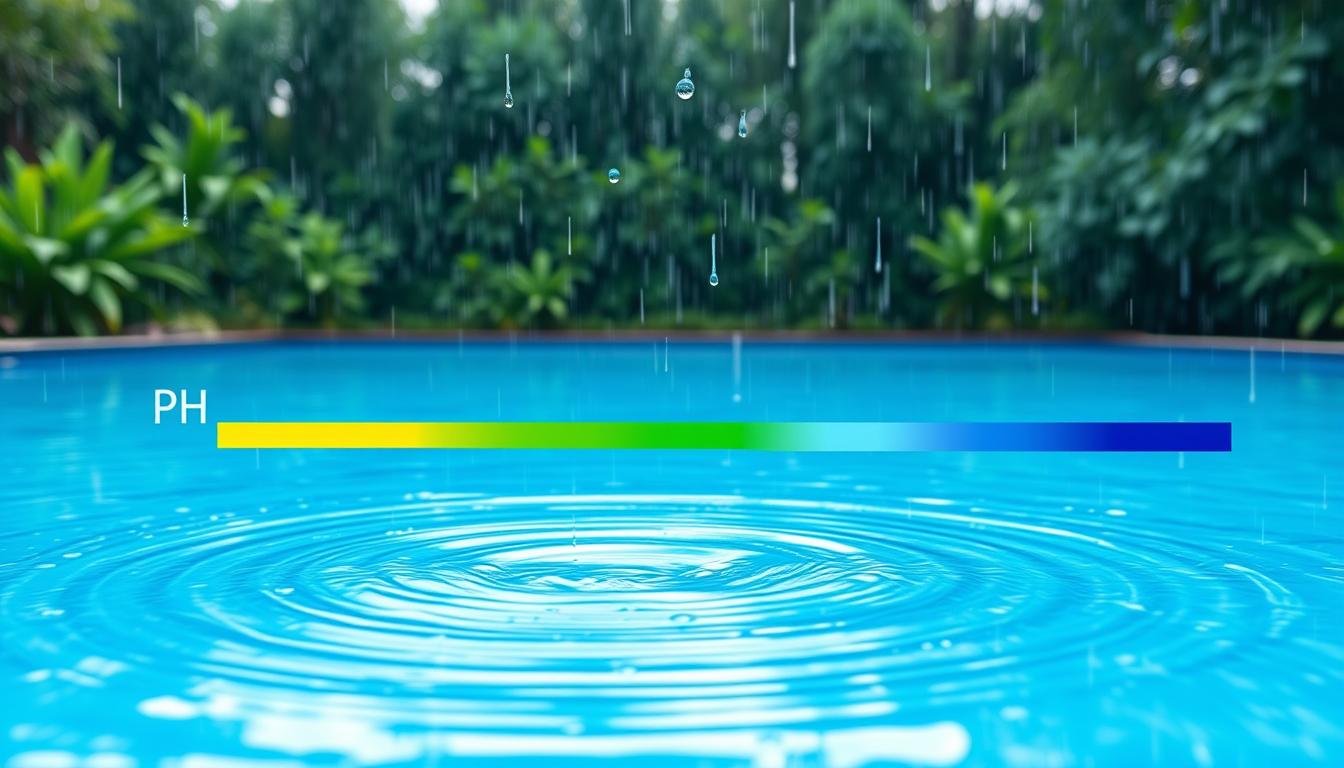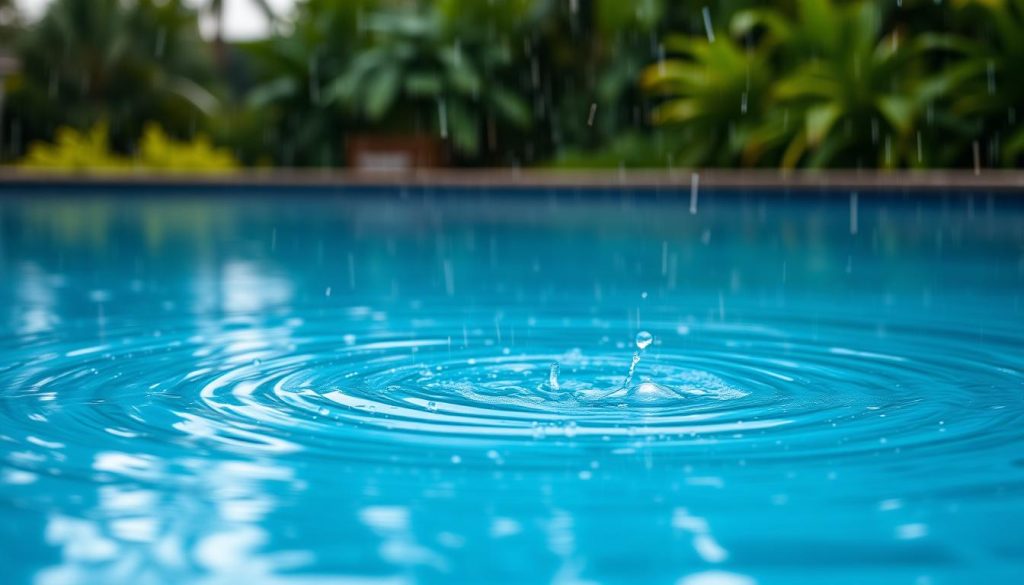
Swimming pools thrive with a pH level between 7.4 and 7.6. This range ensures skin-friendly water and effective chemical action. It also prevents cloudiness and lime deposits in your pool.
Rainwater can greatly affect your pool’s water chemistry. It can change pH levels and dilute important chemicals. This makes it harder to keep your pool clean and safe.
Heavy rainfall dilutes pool chemicals, lowering chlorine and sanitizer levels. This can lead to algae growth and bacterial contamination. Rainwater is naturally acidic, with a pH around 6.
When rain mixes with pool water, it can lower the pH. This drop can cause problems for your pool. It may corrode equipment and irritate swimmers’ skin and eyes.
Low pH also makes it harder to maintain proper sanitizer levels. This can further compromise your pool’s cleanliness and safety.
How Rainwater Affects Pool Water Chemistry
Rainwater can mess up your pool’s water balance. It can lead to problems that need quick fixing. Knowing how rain affects your pool helps keep it safe and comfy.

Rainwater Dilutes Pool Chemicals
Heavy rain can weaken your pool’s chemicals. It lowers chlorine, salt, and other sanitizers. This can make your pool unsafe for swimming.
With less chemicals, algae and bacteria can grow. After a big rain, check and adjust your pool’s chemical levels.
| Chemical | Effect of Rainwater Dilution |
|---|---|
| Chlorine | Lowered levels due to dilution and introduction of pollutants |
| Salt | Reduced concentration, requiring adjustments after heavy rainfall |
| Total Alkalinity | Decreased by 5-10 ppm per day during heavy rains |
Acid Rain and Its Impact on Pool pH Levels
Rainwater is often acidic due to pollution and nature. This acid rain can quickly change your pool’s pH levels.
In the US, rainwater’s average pH is 5.0. This is much lower than good pool water (7.2-7.8). Acid rain can damage pool surfaces and equipment.
It can also irritate swimmers’ skin and eyes.
The pH balance within rainwater is naturally acidic due to the introduction of carbonic and sulfuric acids from pollution, affecting pool water’s acidity.
Rainwater Lowers Total Alkalinity Levels
Total alkalinity helps keep pH levels steady. Rain can lower your pool’s alkalinity by 5-10 ppm daily.
Low alkalinity makes it hard to keep pH balanced. This can lead to more water problems.
Low alkalinity and pH can harm metal surfaces and pool equipment.
- Monitor pool water chemistry regularly, especially after heavy rainfall
- Adjust chemical levels as needed to maintain balanced pool water
- Consider using a pool cover to minimize the impact of rainwater on water chemistry
Additional Factors to Consider During Rainy Season
Rainwater affects pool water chemistry and brings other challenges. Heavy rainfall carries organic debris into the pool, introducing phosphates and nitrogen. This debris fuels algae growth and disrupts water balance.
Leaves and Debris Deposited in Pool
Heavy storms can dump lots of leaves and debris into your pool. This organic matter affects the pool’s look and feeds algae growth. Skim the pool’s surface regularly to remove accumulated debris.
Runoff from Deck or Lawn
Runoff contamination from nearby areas can wash dirt and chemicals into the pool. This runoff may contain fertilizers rich in phosphates and nitrogen, feeding algae. Ensure proper drainage around your pool to minimize this issue.
Consider using a phosphate remover if your pool is often exposed to nature’s organics. This can help maintain water quality and prevent algae growth.
Potential for Algae Growth
Organic debris, runoff nutrients, and changed water chemistry create perfect conditions for algae. Rainwater brings algae spores and lowers active chlorine levels. Take steps to prevent algae blooms in your pool.
- Regularly brushing pool surfaces to remove small algae particles
- Shocking the pool after heavy rainfall to eliminate contaminants
- Using an algaecide before and after rainy periods
- Ensuring proper filtration and circulation to maintain water clarity
| Pool Issue | Causes | Prevention and Treatment |
|---|---|---|
| Green Pool | Algae growth due to organic matter and nutrients | Raise chlorine levels, balance pH, add algaecide, clarifier, and oxidizer, run filtration for 24 hours |
| Brown Pool | Heavy rain runoff containing suspended particles | Use a floccing agent to bind particles, allow settling, then vacuum the pool |
| Pool Overflow | Heavy rainfall exceeding pool capacity | Lower pool water level to halfway up the skimmer box before rain, monitor water levels during rainfall |
Take action to minimize rainy season’s impact on your pool. Address these factors to keep a healthy, balanced swimming environment. Your pool will stay clean and inviting all season long.
does rain lower ph in pool
Rain can lower your pool’s pH levels due to its acidic nature. Acid rain’s pH ranges from 5.5 to 6.5, below the ideal pool water pH of 7.2 to 7.6. Large amounts of rainwater can cause pH levels to drop, unbalancing your pool’s chemistry.
pH Level Fluctuations Due to Rain
Rain’s effect on pool pH depends on rainfall amount, duration, and initial pH level. Heavy rains can significantly lower pH levels, requiring pH increaser products. Regular pH testing is crucial during rainy seasons to maintain balanced water chemistry.
Acid rain can also reduce total alkalinity levels in your pool. Alkalinity stabilizes pH levels and prevents rapid fluctuations. Low alkalinity makes it harder to maintain consistent pH levels in your pool.
Importance of Maintaining Balanced pH Levels
Balanced pH levels in your pool are crucial for several reasons:
- Comfort: Water with a low pH can cause eye and skin irritation for swimmers, making the swimming experience uncomfortable.
- Equipment protection: Acidic water can corrode pool surfaces, equipment, and plumbing, leading to costly repairs and replacements.
- Sanitizer effectiveness: When pH levels rise above the ideal range, the effectiveness of chlorine and other sanitizers diminishes, potentially allowing harmful bacteria and algae to grow.
- Water clarity: Imbalanced pH levels can cause the water to become cloudy, affecting the overall appearance and aesthetics of your pool.
Pool owners should regularly test their water using reliable pH testing kits. If pH is too low, add sodium carbonate (soda ash) to raise it. For high pH, use muriatic acid or pH decreaser products.
“Proper pool maintenance, including regular pH testing and adjustment, is key to ensuring a safe and enjoyable swimming experience for everyone.”
Stay proactive and address pH imbalances caused by rain promptly. This helps maintain a healthy and inviting swimming environment throughout the rainy season.
Conclusion
Rainwater can significantly affect your pool’s water chemistry. It can lower pH levels, causing corrosion and damage to pool components. Heavy rainfall may dilute essential chemicals, reducing the pool’s germ-killing ability.
Regular pool maintenance is crucial for balanced water chemistry. This includes water testing and pH adjustment. Rainwater can also bring in sediments, leaves, and plastic waste.
These issues can lead to increased algae growth. Pool owners may need to “shock” the pool or use stabilizers. Staying proactive in monitoring your pool is essential, especially during rainy seasons.
Regular testing and adjustments help maintain a clean pool. Consistent maintenance ensures a sparkling, inviting pool, regardless of weather conditions. Keep your pool healthy by balancing its chemistry and cleaning it regularly.







